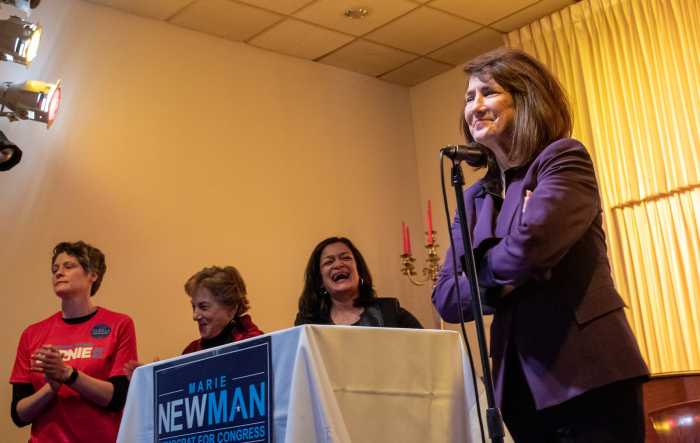The Illinois Human Rights Commission found that a Hobby Lobby store in East Aurora, Illinois, unlawfully discriminated against a transgender employee by prohibiting her from using the women’s restroom at the store — and the employee was awarded $220,000 for emotional distress and legal fees. On August 13, a unanimous three-judge panel of the Appellate Court of Illinois upheld the Commission’s ruling and the damage award.
The appeals court was ruling on a previously undecided question under Illinois’ Human Rights Act: whether an employer or a place of public accommodation must allow transgender employees and customers to use restrooms consistent with their gender identity. The court found that the answer was clear under the statute.
The key holding in the opinion by Justice Mary S. Schostok was that a transgender person whose gender identity has been recognized by the state is entitled to be treated by employers and public accommodations consistent with their gender identity, even though the statute makes clear that its ban on sex discrimination in employment allows employers to maintain separate restroom facilities for men and women. Rejecting Hobby Lobby’s contention that this express exemption from the statute’s sex discrimination provision authorizes Hobby Lobby’s restroom policy, the court concluded that Meggan Sommerville, the transgender employee, is a woman and entitled to be treated as such.
Sommerville began working for Hobby Lobby in 1998, prior to coming out as trans. In 2007, she began her transitioning process. By early 2010, after medical treatment had reconfigured her secondary sex characteristics, she began to use a female name and to appear at work dressed as a woman and wearing makeup. Hobby Lobby raised no objection. After Sommerville obtained a legal name change, a new driver’s license, and a Social Security Card in her new name in 2010, she informed Hobby Lobby that she would begin using the women’s bathroom.
Although Hobby Lobby had changed her personnel records to show her new name and female identity, it refused to allow her to use the women’s restroom at the store, despite the legal documents. Even after Sommerville provided a copy of the Human Rights Act, Hobby Lobby refused to budge and ordered employees to report Sommerville if she tried to use the women’s room. They issued her a written warning on February 23, 2011, for entering the women’s room.
Hobby Lobby finally installed a unisex bathroom in the store in December 2013, and told Sommerville she could use that restroom or the men’s room, but not the women’s room. This was after more than a year and a half of being excluded from the women’s room, when the only facility she was permitted to use was the men’s room.
“Although Sommerville was permitted to use the men’s bathroom at the store,” wrote Justice Schostok, “such use caused her anxiety, as she had to engage in ‘defensive maneuvers’ before entering, such as checking and waiting to make sure that no one else was using the bathroom and attempting to ensure that no one observed her enter, due to her female appearance.”
And when she was in the men’s room, she was concerned about potential violence if a man came in and saw her groomed and dressed as a woman. “She also felt embarrassed and humiliated by being a woman in the men’s bathroom.” She resorted at times to clocking out and going to another store in the area to use a women’s room, but clocking out too frequently caused trouble back at the workplace, and the situation worsened when she developed a medical condition requiring her to use the restroom three or four times during a shift.
She also found the unisex bathroom humiliating. On the one hand, construction of such a facility was a de facto recognition of her gender by Hobby Lobby, but on the other hand, she saw it as segregation and treating her differently from the other women who worked there or patronized the store as customers. As she testified to the Commission, she “felt like in some ways they were recognizing me as female, but yet they were segregating me. I felt as though there were the guys, the gals, and then me.”
In addition, wrote Justice Schostok, “Hobby Lobby’s bathroom ban gave Sommerville recurrent nightmares about bathrooms, being approached by men, and being physically assaulted and laughed at by them. She also developed physical symptoms including headaches, fatigue, muscle cramps, gastric problems, and dehydration due to restricting her fluid intake.” All of these reflect the evidence in numerous other lawsuits where transgender students sued to be able to use appropriate restrooms in their public schools.
Sommerville finally filed a complaint with the Illinois Human Rights Commission, which ruled in her favor on April 10, 2019, but the ruling on damages was stayed by the Commission pending appeal, although it refused to stay the order to allow Sommerville to use the women’s restroom. However, Hobby Lobby quickly appealed to the Appellate Court, which also stayed the restroom order. That stay was not lifted until August 13, when the court issued its ruling in this case.
Relying on dictionary definitions of “sex” which referred to genitals, Hobby Lobby insisted to the Commission and again to the court that it had not violated the statute, since the statute allowed employers to provide separate restrooms for their male and female employees. The court noted, however, that the public accommodations provision, which also forbids gender identity discrimination, did not have such a provision, and that Sommerville was suing both as an employee and as a member of the public who wanted to use the restroom when in the store as a customer.
More to the point, however, the court rejected the argument that a dictionary definition of “sex” based on genitals was dispositive of the issue. The Human Rights Act itself defines sex as “the status of being male or female.” “The phrasing of the definition is broad,” wrote Justice Shostok: “It does not draw distinctions based on genitalia, the sex marker on a birth certificate, or genetic information.” And, it uses the word “status” which is, wrote the judge, “a state of being that may be subject to change.” For example, an employee’s marital status or resident status might change while they are employed, and so, for purposes of the law, may the status of being “male” or “female” as recognized by the state.
The court also pointed to the wording of the statute. When Illinois added the term “sexual orientation” to the law, it defined that term as including “gender-related identity, whether or not traditionally associated with the person’s designated sex at birth.” Thus, the legislature banned discrimination because of gender identity as an aspect of sexual orientation discrimination, and recognized that a person’s gender identity could be different from their genital sex identified at birth. Illinois’ statute is unusual in this regard, but their amendment took place before it became more common for state and local governments to add the term “gender identity” directly to the list of prohibited grounds of discrimination, and they have never gone back to revise the law, as the state’s courts correctly applied the statutory definition to protect transgender people from discrimination.
“Given the interrelationship between ‘sex’ and gender identity in Illinois law,” wrote the judge, “the record establishes that Sommerville’s sex is unquestionably female,” so banning her from using the women’s restroom was definitely discriminating against her because of her sex. As to the dictionary definitions, wrote the court, “the Act provides a clear definition of ‘sex,’ eliminating any need to look further. Moreover, the Act’s definition of ‘sex’ nowhere includes any restriction of that term on the basis of reproductive organs and structures, and we may not insert such a limitation into the statute.”
The court also rejected Hobby Lobby’s objection to the amount of the damages, which they claimed was “excessive.” The standard of judicial review for a Commission damage award is “abuse of discretion.” The court found that the Commission had justified the amount by its factual findings about the impact of Hobby Lobby’s actions on Sommerville, and the duration of that impact. In some other cases, the Commission had awarded emotional distress damages in the $50,000 range where the discrimination lasted a year to a year-and-a-half. In this case, Sommerville suffered for five or more years, so an award of $220,000, including attorneys’ fees, was not excessive, and a legitimate exercise of discretion.
In addition, the court granted Sommerville’s motion to send the case back to the Commission so it could revise the damage award upwards to take account of her exclusion from the women’s facilities for the additional time that the Commission’s access order was stayed during the appeal.
Sommerville was represented in opposing Hobby Lobby’s appeal by Chicago attorney Jacob Meister, and the state’s Attorney General and Solicitor General’s office represented the Commission. Attorneys from Lambda Legal and the Illinois chapter of the ACLU, as well as cooperating attorneys from Latham & Watkins, participated as amicus advocates in support of the Commission’s ruling.





































